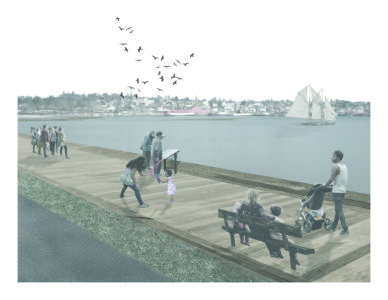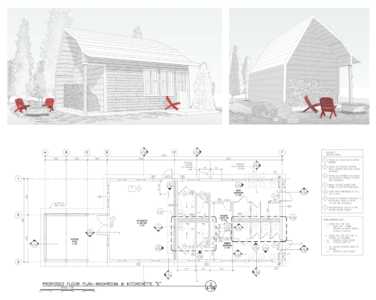Students find co-op success among pandemic challenges
When COVID-19 shutdowns started rolling out this spring, two cohorts of ArchPlan co-op students found themselves in a precarious situation. Master of Architecture (MArch) students were a quarter through their work term and Master of Planning (MPlan) students were trying to secure their summer placements. Students grappled with working from home, layoffs, hiring freezes, and a general tightening of budgets across all sectors attempting to stay afloat though troubled times.
In spite of these challenges and with the help of dedicated employers, a hard-working co-op office, government funding, and the support of the Schools of Architecture and Planning, the majority of these students have now completed their work terms. The Faculty recognizes these collective efforts but mostly is delighted in the individual creativity and resilience our students showed in completing successful mid-pandemic co-op placements. We highlight the following examples.
Kevin Cooper
 Kevin Cooper landed a co-op placement with Halifax Regional Municipality (HRM), early in the hiring process. When the pandemic reality set in, HRM canceled all their co-op work terms. “Losing my first offer, although not surprising, was very disappointing” remembers Kevin. “I had that moment where I realized that all the other jobs I was interested in were now filled.”
Kevin Cooper landed a co-op placement with Halifax Regional Municipality (HRM), early in the hiring process. When the pandemic reality set in, HRM canceled all their co-op work terms. “Losing my first offer, although not surprising, was very disappointing” remembers Kevin. “I had that moment where I realized that all the other jobs I was interested in were now filled.”
Kevin had to rejoin the job competition and start from scratch. Meanwhile, Bruce Mans (MPLAN ‘11) and Steffen Käubler (MURP ’03) of UPLAND, after having initially decided not to hire a student for the summer because of the uncertainties their firm faced due to the sudden emergence of Covid-19, were able to take advantage of an increase in the government wage subsidy and decided to go ahead. Kevin took advantage of this momentary opportunity to be available at the right time to interview and land an ideal placement with UPLAND.
 Once hired, Kevin addressed new workplace challenges. “It was difficult to adapt to so many changes in the work-from-home scenario”, says Kevin. “But I was able to set up a home office in a small shared space. This helped me to develop healthy work habits”, he reflects. “It is so important to get this right!” A phased re-occupancy at the UPLAND office in Dartmouth did allow for some in-person experience. Kevin remembers his first time in the office as very exciting! “Getting a tour, going for lunch, meeting with colleagues, participating in site visits – all these things contributed to my overall experience.”
Once hired, Kevin addressed new workplace challenges. “It was difficult to adapt to so many changes in the work-from-home scenario”, says Kevin. “But I was able to set up a home office in a small shared space. This helped me to develop healthy work habits”, he reflects. “It is so important to get this right!” A phased re-occupancy at the UPLAND office in Dartmouth did allow for some in-person experience. Kevin remembers his first time in the office as very exciting! “Getting a tour, going for lunch, meeting with colleagues, participating in site visits – all these things contributed to my overall experience.”
Kevin contributed to projects that impacted communities across the entire province. Highlights of Kevin’s work term included producing renderings representing what design interventions would look like on the ground, contributing to the Lunenburg Comprehensive Community Plan, the Clare Tourism Development Plan, and helping execute public engagement sessions in Inverness, Cape Breton. “Overall, especially given circumstances, I had a great experience with co-op” remarks Kevin.
Celine Jabbour
 Celine Jabbour is an MArch student who was in the middle of an eight month work term when offices began closing. This resulted in a reduction of workload and some temporary layoffs. Her employer, Stantec, had to make the difficult decision to discontinue her co-op term before her hours were fulfilled. “This was so stressful”, remembers Celine. “I did not want to lose a year or have to extend a year. I needed a solution.” Celine worked with Career Services in close consultation with the Director of the School of Architecture and came up with an alternative. Celine was hired by her father’s development company, MCO investments, and worked with the in-house architect and engineer on assembly details for a hotel under construction. This “back-up plan” offered her the experience of working closely with engineers and gave her exposure to civil and mechanical drawings not typically encountered in an architecture office.
Celine Jabbour is an MArch student who was in the middle of an eight month work term when offices began closing. This resulted in a reduction of workload and some temporary layoffs. Her employer, Stantec, had to make the difficult decision to discontinue her co-op term before her hours were fulfilled. “This was so stressful”, remembers Celine. “I did not want to lose a year or have to extend a year. I needed a solution.” Celine worked with Career Services in close consultation with the Director of the School of Architecture and came up with an alternative. Celine was hired by her father’s development company, MCO investments, and worked with the in-house architect and engineer on assembly details for a hotel under construction. This “back-up plan” offered her the experience of working closely with engineers and gave her exposure to civil and mechanical drawings not typically encountered in an architecture office.
 Celine was flexible again when circumstances changed and Stantec was able to bring her back to finish her work term. She agreed and gained experience in LEED certification and the productions of construction drawings for a Parks Canada project. In the end she used hours from both employers toward her requirement and ended up with a very thorough and diverse experience. “It was a crazy few months, says Celine, but we all made it work.”
Celine was flexible again when circumstances changed and Stantec was able to bring her back to finish her work term. She agreed and gained experience in LEED certification and the productions of construction drawings for a Parks Canada project. In the end she used hours from both employers toward her requirement and ended up with a very thorough and diverse experience. “It was a crazy few months, says Celine, but we all made it work.”
Both students reflect that there could have been a very different outcome and they recognize Tiffany MacDonald from Career Services for her unwavering support and helping them navigate employers, funding and requirements. The Faculty is grateful for Tiffany’s support in her role during extraordinarily challenging times as well as to our employers and funding bodies for making it possible to provide our students with experiential learning opportunities. Congratulations to all the students who overcame tremendous odds to further their education and fulfill their co-op requirement.